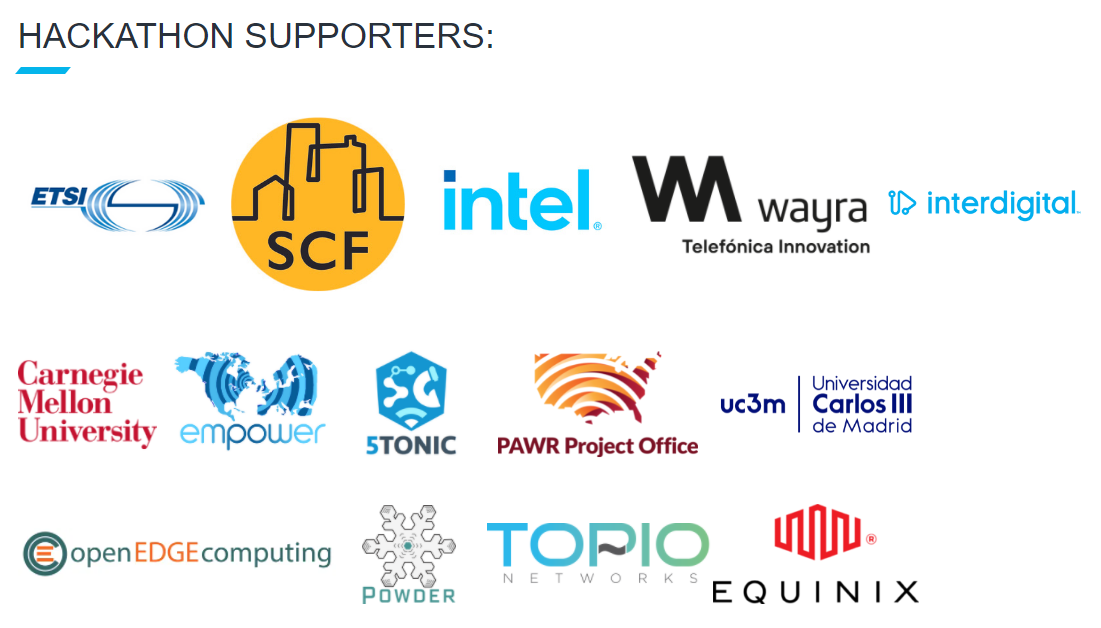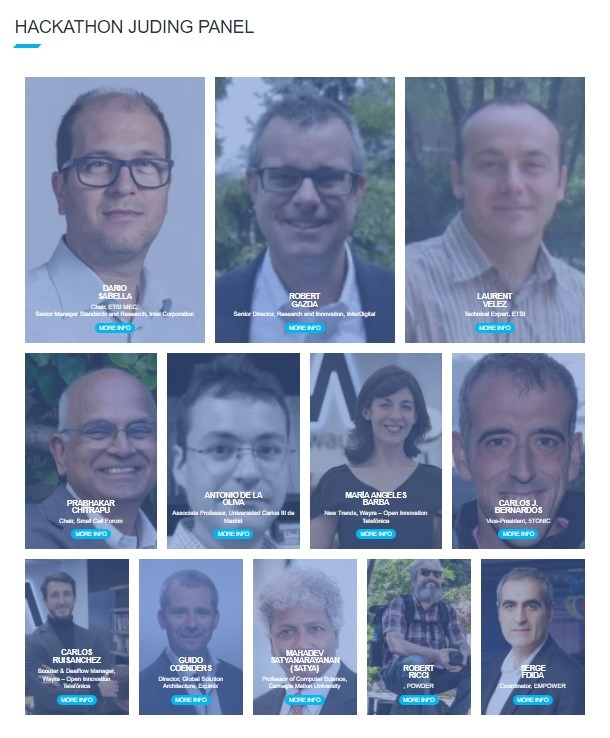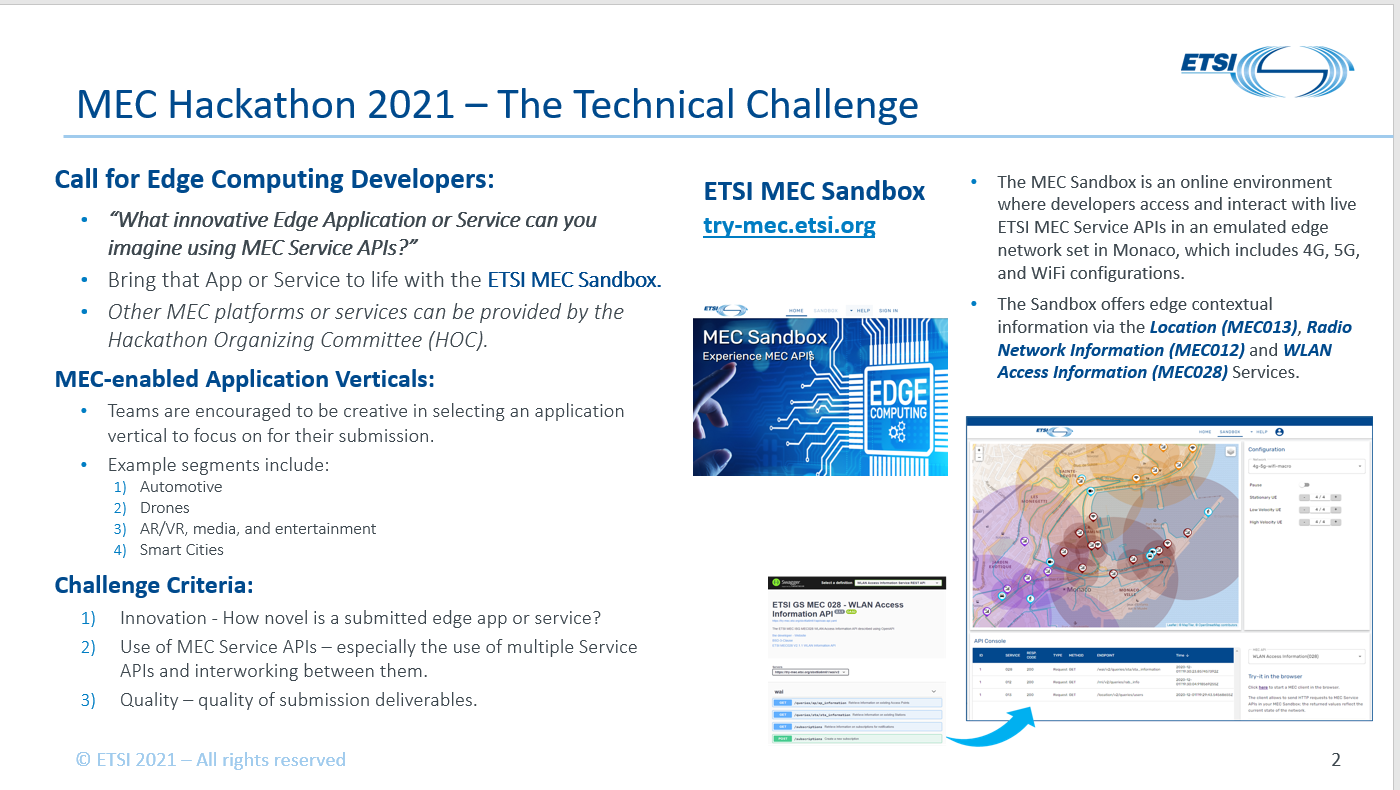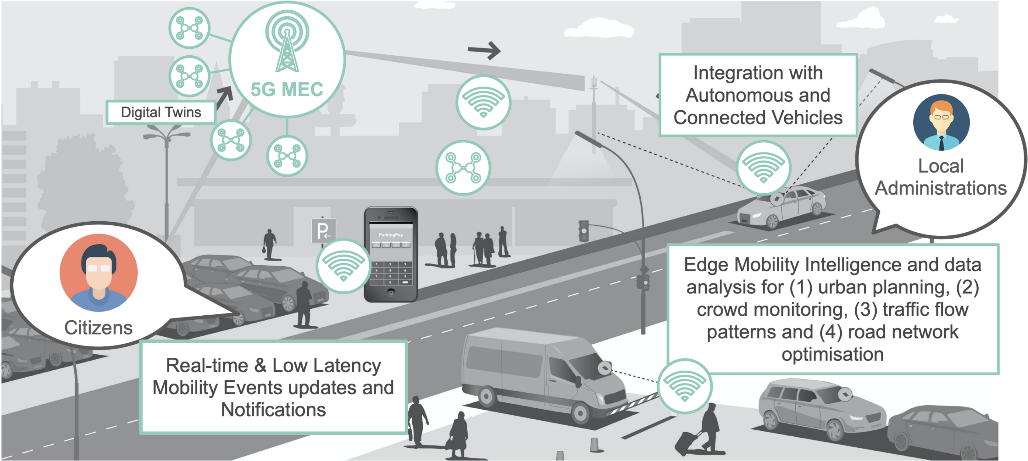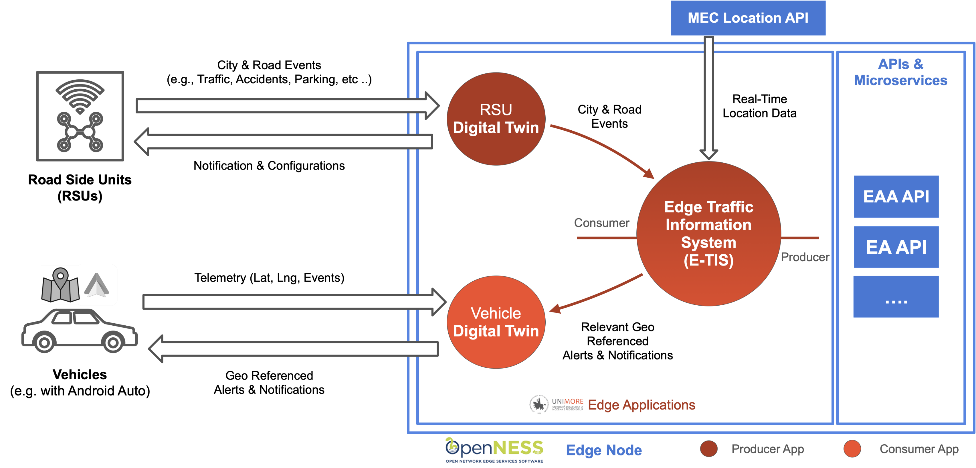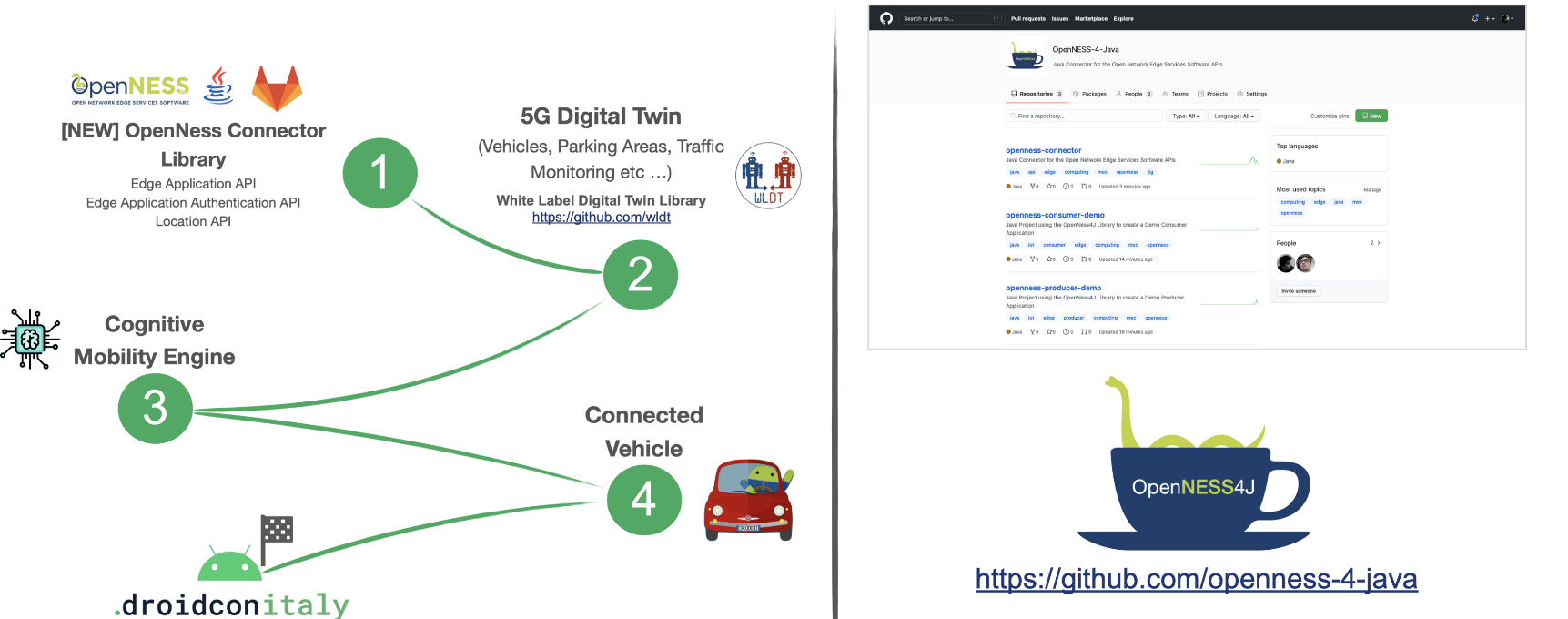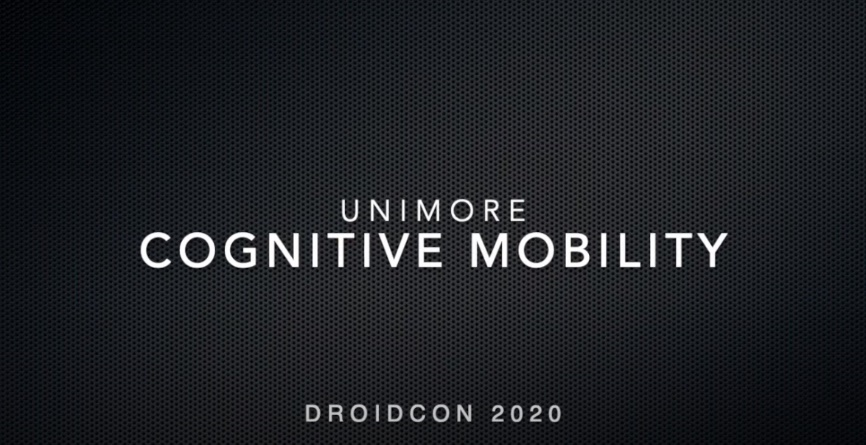MEC Hackathon 2021 Edge Computing World: Difference between revisions
(Created page with "__TOC__") |
No edit summary |
||
| Line 1: | Line 1: | ||
__NOTOC__ | |||
[[File:2020-hackathon-banner1.jpg|1200px|center|top|class=img-responsive]] | |||
<br> | |||
= Organization = | |||
=== Details === | |||
ETSI is pleased to be the official partner of THE EDGE COMPUTING WORLD who hosted this annual Hackathon on 12-14 October 2021. The Hackathon was held virtual over the summer. Edge Computing World was hosting the Hackathon information portal and was the venue for final pitches and judging of the Hackathon entries during the Edge Developers Conference on 12 October 2021. | |||
<br> | |||
This year’s challenge was “What innovative Edge Application or Service can you imagine using MEC Service APIs?” Contestants will be asked to bring that app or service to life with the ETSI MEC Sandbox. Teams are encouraged to be creative in selecting an application vertical to focus on for their submission, include:Automotive, Drones, AR/VR, media, and entertainment & Smart Cities. | |||
__TOC__ | __TOC__ | ||
=== Supporting organizations === | |||
[[File:2021-hack-supporters.png|800px|center|top|class=img-responsive]] | |||
=== Hackathon phases: === | |||
* April 2020 – publication of the [https://www.etsi.org/images/files/Events/2020/Droidcon_MEC_Hackathon/Droidcon-MEC-Hackathon-2020-CfD.pdf Call-For-Developers] | |||
* June 4th – [//mecwiki.etsi.org/images/2020_droidcon_webinar.pdf MEC Webinar] | |||
* June 15th Submission Deadline (extended to 30/06) | |||
* July 2020 – remote access to MEC servers offered to the admitted MEC Hackathon developers | |||
* July-November – actual WORK | |||
* 12 – FINAL DAYS of the Hackathon! | |||
Final deadline for submission 28 July 2021 | |||
Registration Notification to the teams: 6 August 2021. | |||
* Event Webinars part 1: https://youtu.be/YqWPad-O_SE | |||
{{#evu:https://www.youtube.com/watch?v=YqWPad-O_SE | |||
|alignment=center | |||
|dimensions="120" | |||
}} | |||
<br> | |||
* Event Webinars part 2: https://youtu.be/gFLfx8Yacck | |||
{{#evu:https://www.youtube.com/watch?v=gFLfx8Yacck | |||
|alignment=center | |||
|dimensions="120" | |||
}} | |||
<br> | |||
=== Jury members === | |||
[[File:2021-hack-jury.png|600px|center|top|class=img-responsive]] | |||
<br> | |||
= Technical challenge = | |||
Teams were provided with a dedicated instance of the ETSI MEC Sandbox for their work over the duration of the Hackathon. The MEC Sandbox is an online environment where developers access and interact with live ETSI MEC Service APIs in an emulated edge network set in Monaco, which includes 4G, 5G, and WiFi configurations. The MEC Sandbox offers edge contextual information via the Location (MEC013), Radio Network Information (MEC012) and WLAN Access Information (MEC028) ETSI MEC Service APIs. | |||
[[File:2021-hack-challenge.png|800px|center|top|class=img-responsive]] | |||
<br> | |||
= Awards = | |||
=== Prizegiving day === | |||
{{#evu:https://www.youtube.com/watch?app=desktop&v=-BbMKRRJvGc&feature=youtu.be | |||
|alignment=center | |||
|dimensions="120" | |||
}} | |||
=== Awarded project === | |||
The MEC Hackathon winner, UniMore, showcased a project on Cognitive mobility at the Edge, an automotive application solution exploiting features and services provided by the 5G MEC architecture (including a MEC Location API) in order to deliver low-latency location-based event notifications about traffic, congestion forecast, and mobility patterns. | |||
[[File:2020-hack-award2.png|800px|center|top|class=img-responsive]] | |||
<br> | |||
[[File:2020-hack-award3.png|800px|center|top|class=img-responsive]] | |||
<br> | |||
<br> | |||
See the video here: | |||
{{#evu:https://www.youtube.com/watch?v=3sy8gz_XTvA | |||
|alignment=center | |||
|dimensions="120" | |||
}} | |||
<br> | |||
As a part of the final software prototype, the UniMore team also released the Openness Connector java library on Github (https://github.com/openness-4-java) to ease the life of developers willing to interact with the MEC API provided by the Openness platform. | |||
<br> | |||
[[File:2020-hack-award4.png|center|top|class=img-responsive]] | |||
<br> | |||
<br> | |||
=== Winner team === | |||
The UniMore team is composed by very experienced Droidcon Hackathon developers and researchers at the Department of Sciences and Methods for Engineering of the University of Modena and Reggio Emilia. | |||
<br> | |||
[[File:2020-hack-award1.png|250px|center|top|class=img-responsive]] | |||
<br> | |||
Among the other prizes, the Hackathon winner was offered the possibility to participate to the Smart Road project (a consortium of partners, from car makers, network operators, universities and the City of Turin), with the aim of proposing their developed solution as possible implementation for testing activities in the Turin urban environment. In this perspective, the UniMore Team continued the implementation activities related to their V2X applications scenarios. | |||
Revision as of 13:55, 3 December 2021
Organization
Details
ETSI is pleased to be the official partner of THE EDGE COMPUTING WORLD who hosted this annual Hackathon on 12-14 October 2021. The Hackathon was held virtual over the summer. Edge Computing World was hosting the Hackathon information portal and was the venue for final pitches and judging of the Hackathon entries during the Edge Developers Conference on 12 October 2021.
This year’s challenge was “What innovative Edge Application or Service can you imagine using MEC Service APIs?” Contestants will be asked to bring that app or service to life with the ETSI MEC Sandbox. Teams are encouraged to be creative in selecting an application vertical to focus on for their submission, include:Automotive, Drones, AR/VR, media, and entertainment & Smart Cities.
Supporting organizations
Hackathon phases:
- April 2020 – publication of the Call-For-Developers
- June 4th – MEC Webinar
- June 15th Submission Deadline (extended to 30/06)
- July 2020 – remote access to MEC servers offered to the admitted MEC Hackathon developers
- July-November – actual WORK
- 12 – FINAL DAYS of the Hackathon!
Final deadline for submission 28 July 2021 Registration Notification to the teams: 6 August 2021.
- Event Webinars part 1: https://youtu.be/YqWPad-O_SE
- Event Webinars part 2: https://youtu.be/gFLfx8Yacck
Jury members
Technical challenge
Teams were provided with a dedicated instance of the ETSI MEC Sandbox for their work over the duration of the Hackathon. The MEC Sandbox is an online environment where developers access and interact with live ETSI MEC Service APIs in an emulated edge network set in Monaco, which includes 4G, 5G, and WiFi configurations. The MEC Sandbox offers edge contextual information via the Location (MEC013), Radio Network Information (MEC012) and WLAN Access Information (MEC028) ETSI MEC Service APIs.
Awards
Prizegiving day
Awarded project
The MEC Hackathon winner, UniMore, showcased a project on Cognitive mobility at the Edge, an automotive application solution exploiting features and services provided by the 5G MEC architecture (including a MEC Location API) in order to deliver low-latency location-based event notifications about traffic, congestion forecast, and mobility patterns.
See the video here:
As a part of the final software prototype, the UniMore team also released the Openness Connector java library on Github (https://github.com/openness-4-java) to ease the life of developers willing to interact with the MEC API provided by the Openness platform.
Winner team
The UniMore team is composed by very experienced Droidcon Hackathon developers and researchers at the Department of Sciences and Methods for Engineering of the University of Modena and Reggio Emilia.
Among the other prizes, the Hackathon winner was offered the possibility to participate to the Smart Road project (a consortium of partners, from car makers, network operators, universities and the City of Turin), with the aim of proposing their developed solution as possible implementation for testing activities in the Turin urban environment. In this perspective, the UniMore Team continued the implementation activities related to their V2X applications scenarios.

